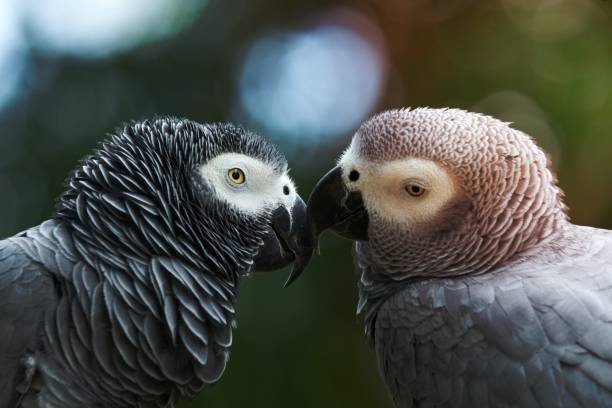
Parrot Personalities Unveiled: Exploring the Unique Traits of African Greys, Macaws, and More
Dive into the fascinating world of parrots and discover how distinct breeds like African Greys and Macaws showcase unique personalities, behaviors, and intelligence that influence their care and companionship.
🐶 Pet Star
27 min read · 21, Jul 2025

Introduction: Understanding the World of Parrot Personalities
Parrots are among the most captivating and intelligent creatures in the avian world. Beyond their brilliant colors and impressive vocal abilities, their personalities can be as varied and complex as those of dogs or cats. From the famously clever African Grey to the vibrant and social Macaws, each breed possesses unique behavioral traits and temperaments shaped by genetics, environment, and evolutionary history.
This article explores the personality traits of several popular parrot species, focusing on how breeds like African Greys and Macaws differ in behavior, intelligence, social needs, and compatibility as pets. Understanding these distinctions is crucial for potential parrot owners and enthusiasts who seek to provide appropriate care and enrich their birds’ lives. We will delve into scientific studies, expert opinions, and real-life examples to paint a comprehensive picture of parrot personalities and what they mean for those who share their homes.
African Greys: The Genius Linguists
Intelligence and Cognitive Abilities
The African Grey Parrot (Psittacus erithacus) is widely regarded as one of the most intelligent bird species. Research from institutions like Harvard and the University of California has demonstrated their remarkable cognitive abilities, including problem-solving, memory, and comprehension of human speech.
- Vocabulary: African Greys can develop vocabularies exceeding 1,000 words.
- Concept Understanding: Studies show they grasp abstract concepts such as shapes, colors, and numbers.
- Emotional Intelligence: These parrots can respond to human emotions and moods, displaying empathy-like behaviors.
Personality Traits
African Greys tend to be reserved but deeply affectionate with trusted caregivers. They are known for their curiosity, caution around strangers, and tendency toward attachment to a single person.
- Cautious and Sensitive: They may become shy or stressed in chaotic environments.
- Strong Bonding: African Greys often form lifelong bonds, requiring consistent interaction.
- Vocal and Expressive: Their ability to mimic speech makes them engaging conversational companions.
Behavioral Challenges
Despite their intelligence, African Greys can be prone to behavioral issues if not mentally stimulated or if neglected.
- Feather Plucking: A common sign of stress or boredom.
- Screaming: Used as communication when feeling ignored.
- Anxiety: Sensitive to changes in routine or environment.
Macaws: The Social Giants
Physical and Behavioral Overview
Macaws are among the largest parrots, known for their stunning plumage and boisterous personalities. Popular species include the Blue-and-Gold Macaw, Scarlet Macaw, and Hyacinth Macaw.
- Size and Lifespan: Macaws can live 50 years or more, requiring a long-term commitment.
- Social Behavior: Highly social and playful, macaws thrive in interaction with people and other birds.
- Vocalization: Known for loud calls and vocal play, they are not shy about expressing themselves.
Personality and Temperament
Macaws display outgoing, confident personalities and enjoy being the center of attention.
- Playful and Mischievous: Known for their curiosity and tendency to explore.
- Affectionate: They seek physical contact, enjoying petting and cuddling.
- Bold and Adventurous: Macaws can be fearless and require ample space to express natural behaviors.
Behavioral Considerations
Macaws’ high energy and intelligence mean they need plenty of mental and physical stimulation.
- Destructive Chewing: A natural behavior that can become problematic without proper outlets.
- Loud Vocalizations: Their calls can be disruptive if not managed.
- Separation Anxiety: Macaws may develop stress-related behaviors when left alone for long periods.
Cockatoos: The Emotional Entertainers
Emotional Intelligence and Sensitivity
Cockatoos, such as the Sulphur-Crested and Moluccan varieties, are known for their strong emotional connection with owners and expressive behaviors.
- Affectionate and Loyal: They crave attention and form deep attachments.
- Highly Sensitive: Changes in environment or routine can cause stress.
- Expressive Body Language: Crest movements and vocalizations communicate mood effectively.
Unique Personality Traits
Cockatoos are playful, affectionate, and often described as “clowns” due to their entertaining antics.
- Need for Interaction: They require constant engagement to avoid boredom.
- Attention-Seeking: Can become demanding or noisy if neglected.
- Intelligent Problem Solvers: Enjoy puzzles and learning new tricks.
Challenges and Care Requirements
Due to their emotional nature, cockatoos can develop challenging behaviors if needs are unmet.
- Feather Plucking and Screaming: Indicators of distress.
- Strong Willfulness: Requires consistent training and boundaries.
- Potential for Aggression: Especially during hormonal phases or if feeling threatened.
Conures: The Affectionate Clowns
Overview of Personality
Conures, including the popular Sun Conure and Green-Cheeked Conure, are small to medium-sized parrots known for their playful and affectionate personalities.
- Social and Outgoing: They thrive on interaction with family members.
- Vocal but Manageable: Less noisy than macaws but still communicative.
- Curious and Energetic: Love exploring and playing with toys.
Behavioral Traits
Conures are affectionate and often enjoy cuddling, but they also have a mischievous streak.
- Attention Demanders: May resort to vocalizing to gain attention.
- Bonding: Tend to bond closely with one or two family members.
- Adaptability: Generally adjust well to new environments and routines.
Challenges in Care
While generally easier to manage, conures still require mental stimulation and socialization.
- Potential for Screaming: To express boredom or frustration.
- Nipping: Sometimes exhibit biting behavior if not socialized properly.
- Messiness: Known for being somewhat messy eaters.
Amazon Parrots: The Charismatic Talkers
Vibrant Personalities and Communication Skills
Amazon parrots are renowned for their bright green feathers and remarkable ability to mimic human speech with clarity. Species such as the Yellow-naped Amazon and Blue-fronted Amazon stand out for their social and vocal nature.
- Gifted Talkers: Amazons often have large vocabularies and can develop impressive speech patterns.
- Playful and Interactive: They enjoy engaging in games and interactive play with their owners.
- Confident and Outgoing: Typically bold, they enjoy exploring their environment and interacting with new people.
Temperament and Behavioral Traits
Amazon parrots are energetic and can be very demanding of attention.
- Affectionate but Independent: They enjoy affection but appreciate autonomy, sometimes displaying stubbornness.
- Vocal Expression: Known to be noisy, they vocalize to communicate mood, demand attention, or mark territory.
- Strong-Willed: This breed requires patient training to curb occasional bossiness.
Challenges of Caring for Amazons
Their intelligence and high energy require dedicated care and mental stimulation.
- Potential for Aggression: Without proper socialization, Amazons can develop aggressive behaviors.
- Screaming and Noise: Their vocalizations can be loud and persistent.
- Destructive Tendencies: Like many parrots, they may chew destructively if bored or anxious.
Lovebirds: Small Size, Big Personality
Social and Affectionate Traits
Lovebirds, including species like the Peach-faced and Fischer’s Lovebird, are among the smallest parrots but are packed with personality. Their name derives from their strong pair bonding and affectionate nature.
- Highly Social: Lovebirds thrive in pairs or small groups and form strong bonds.
- Curious and Playful: Known for playful antics and explorative behaviors.
- Vocal but Less Loud: They communicate frequently but tend to be less disruptive than larger parrots.
Behavior and Interaction
Despite their size, lovebirds have bold personalities.
- Bonding Needs: Often form a “pair bond,” which can lead to jealousy if their human owner tries to compete.
- Energetic and Active: They need plenty of toys and stimulation.
- Territorial: Can exhibit possessiveness, especially during breeding season.
Care Considerations
Lovebirds’ social nature means they require constant companionship or risk behavioral issues.
- Possible Aggression: Towards other birds or even owners if feeling threatened.
- Messiness: Active feeders who can be quite messy.
- Long Lifespan: Typically live 10-15 years, demanding long-term commitment.
Conclusion
Understanding parrot personalities is essential for anyone considering these remarkable birds as companions. Breeds like African Greys and Macaws each bring unique traits shaped by evolution, intelligence, and social needs. African Greys impress with their cognitive prowess and reserved nature, requiring mental stimulation and emotional sensitivity. Macaws, on the other hand, captivate with their outgoing, playful demeanor and demand for physical activity and social interaction. Cockatoos, Conures, Amazons, and Lovebirds add even more variety, each with distinct emotional and behavioral profiles that influence how they relate to humans and adapt to home environments.
Recognizing these differences allows owners to create supportive, enriching spaces that cater to individual needs, reducing behavioral problems and enhancing the bond between bird and human. The challenges — from loud vocalizations to destructive behaviors — are manageable with informed care, proper training, and commitment. Moreover, scientific research underscores that parrots are not just colorful pets but intelligent beings with complex personalities, deserving respect and understanding.
Choosing the right parrot breed means aligning their personality with your lifestyle, patience, and environment. As we continue to learn more about avian cognition and personality, the potential for harmonious, fulfilling relationships with these birds grows exponentially. Whether you favor the quiet brilliance of an African Grey or the exuberant charm of a Macaw, embracing their individuality is the key to lifelong companionship and mutual happiness.
Frequently Asked Questions (FAQs)
Q1: What makes African Grey parrots so intelligent compared to other breeds?
A: African Greys have demonstrated advanced problem-solving skills, extensive vocabularies, and the ability to understand abstract concepts, making them one of the smartest parrot species.
Q2: Are Macaws suitable for first-time parrot owners?
A: Macaws are high-energy, loud, and require significant space and social interaction, so they may be challenging for beginners.
Q3: How can I prevent feather plucking in sensitive parrots like cockatoos?
A: Providing mental stimulation, a consistent routine, social interaction, and environmental enrichment helps reduce stress-related feather plucking.
Q4: Do smaller parrots like Conures require less care than larger species?
A: Not necessarily; Conures need regular interaction, mental challenges, and space to thrive despite their smaller size.
Q5: Can parrots understand human emotions?
A: Yes, many parrots, especially African Greys and Cockatoos, can respond to human moods and adjust their behavior accordingly.
Q6: What is the average lifespan of popular pet parrots?
A: Lifespans vary widely—African Greys and Macaws can live 50+ years, while Conures and Lovebirds typically live 10-25 years.
Q7: How loud are parrots like Amazons compared to others?
A: Amazons are known for being particularly loud and vocal, often more so than smaller parrots like Lovebirds.
Q8: Is it better to keep parrots in pairs or alone?
A: Many parrots are social and thrive with companions, but bonding dynamics vary; some prefer a strong human bond instead.
Q9: Can parrots be trained like dogs?
A: Yes, parrots can learn tricks, commands, and behaviors using positive reinforcement, though training requires patience.
Q10: What factors influence a parrot’s personality besides breed?
A: Individual genetics, early socialization, environment, and owner interaction all shape a parrot’s unique personality.
Similar Articles
Find more relatable content in similar Articles

Vegan Pet Toys and Accessories That Last Longer...
As pet owners grow more eco-co.. Read More

Sustainable Pet Products: What to Look for in 2025...
As sustainability becomes a ce.. Read More

How Pets Strengthen Family Bonds...
Pets are more than just compan.. Read More

How Climate Change Affects Wild and Domestic Animals...
Climate change is dramatically.. Read More
Explore Other Categories
© 2024 Copyrights by rPets. All Rights Reserved.